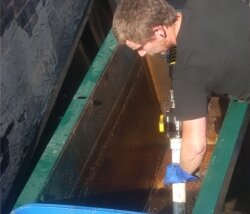Hot oil: Grease creates a lucrative new crime
Back in the day, when John Spagnolo was in the restaurant business, he remembers having to pay to get rid of used cooking oil.
"Then they began taking it away for free," says Spagnolo, a sales manager with Greenlight Biofuels, a locally-based company founded in 2007 that collects and processes waste oil in Virginia and Maryland to produce biodiesel fuel. "Now we pay restaurants for their used cooking oil."
Indeed, with gas prices so high, the demand for biodiesel has been rising. According to the National Biodiesel Board, one billion gallons of the stuff is now being produced every year. As they say, it's a hot commodity. And as a result, crooks are stealing the stuff. At peak times, it sells on the street for as much a $4 a gallon.
"This is a big problem for us," says Spagnolo, who estimates that they lose between 20 and 40 percent of their oil to thieves.
But how do the cooking oil crooks do it?
"The same way we do," says Spagnolo. "Pros now use tank trucks with a vacuum system, and just pull up to the containers behind restaurants."
It's forced the company to create a Theft Prevention Department, which educates restaurant owners on identifying and reporting theft, securing their containers, and has even been going after the thieves themselves.
In Arlington, police conducted a sting operation for Greenlight that led to the arrest of two men. A trial is scheduled next month.
"It's new crime, so our lawyers aren't exactly sure how they're going to handle this," says Spagnolo. "It will be interesting to see how the court approaches this."
While Spagnolo says that most of the theft is happening in big urban areas, like Baltimore, he says its happening to some degree everywhere, even in Central Virginia.
Indeed, while the rising price of biodiesel has a been a boon for the company, it's also become an easy target for cooking oil crooks. Since Greenlight also sources used oil from other suppliers, and the industry is so new, its also been hard to determine if they might actually be purchasing used oil that was stolen from them.
"There's simply a big market for it now, " says Spagnolo.


13 comments
I used to have an agreement with one of the Five Guys Franchisee's in the area, and had my own drums at their restaurants when I still lived in VA to get oil for my SVO converted Rabbits and Mercedes. But I do know plenty of guys who just take the oil straight from the grease dumpsters.
A friend of mine used biodiesel in his truck, and it ended up fouling the motor. It was at that point that he found out that using biodiesel voids the warrantry. Anybody else heard of this?
Biodiesel comes from corn, soybeans, sunflowers.
. If you replace gasoline with biodiesel, you will have to grow more corn, soybeans and sunflower crops.
One gallon of biodiesel does not come close to matching the energy value of one gallon of gasoline.
So do the math, if you plant every available acre of land in the U.S. with corn, soybean, and sunflowers, you still would not make enough to match the energy demands of our society. And where would you plant the corn we eat????
Face it, we are married to gasoline for a long long time.
Biodiesel comes from waste vegetable oil from restaurant deep-fryers and quality grease recovery devices like the Goslyn.
Restaurant waste grease is better used for biodiesel than going to landfill. Restaurants change their vegetable oil in deep-fryers every week at least. Think about it!
Waste vegetable oil (wvo) must be filtered as well as dewatered to begin the process.
Large frms create proper biodiesel. Home made Biodiesel sounds risky to me.
see www.greasetrap.ca
I guess biodiesel just magically shows up in restaurant fryers without starting out as corn, soybean or sunflowers????????
Springsteen .... I will explain it all if you need the help ..... Biodiesel comes from corn , soybean, sunflower etc .... and as a waste bi-product of deep-fryer vegetable oil ..... I hope Springsteen understands now .,,,,,, sorry for the great confusion
Your not looking at the big picture, The airlines and trucking industries are actively pursuing biofuels from corn, soybean, and sunflower oils. This will require massive amounts of a bad idea.
If you think you are saving the planet by draining fryers........ Ha!
United Citizen: I can't speak to GM and Dodge trucks and I can't speak to Ford diesels earlier than their 6.0 liter Powerstroke but I have read that biodiesel will definitely cause you to perform very expensive repairs. If I remember correctly the biodiesel screws up the fuel injectors.
My last comment is that biodiesel made with waste products is a great idea and use of something that would alternatively go to landfill. Be clear, I am talking waste vegetable oil here. It must be professionally filtered and dewatered. I have read great success when aded to everyday diesel fuel as only a percentage of the finished product. (usually 10-30%) Waste to fuel is good.
Growing corn and using it directly for biodiesel is a separate topic that I am not qualified to comment on.
@nicknameoscar: My friend had a Dodge, and I think it was the fuel injectors now that you mention it.
Anybody else have warranty issues after burning biodiesel?
Yeah, My cars engine had a heart attack.
Frankie Valli was prescient.
R.I.P.: Eve Arden
I have run B100 in my TDI, 2006 with no issues. The problem is finding it here in Charlottesvlle. Why doesn't Greenlight, a Charlottesville based company, sell it here??? Their closest dealer is in MD. Use it or don't use it, but sell it here.
As far as dealer warranty, probably not going to cover over B10 or B20, I don't care, I know mine runs fine. And it is from "used veggie oil" which is great, not a real big fan of growing veggies for fuel. As far as I know corn is used for ethanl, not biodiesel, and several other options, algea various nuts (more from other countries then grown here)